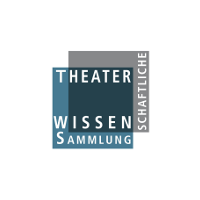Werner Nekes zum 80. Geburtstag
28.-30. April 2024, Theaterwissenschaftliche Sammlung, Schloss Wahn
In Gedenken an Werner Nekes, der am 29. April 2024 80 Jahre alt geworden wäre, veranstaltet die TWS vom 28. bis 30. April 2024 in Zusammenarbeit mit ihren Partnern, dem DFF – Deutsches Filminstitut & Filmmuseum, Frankfurt am Main, und dem Filmmuseum Potsdam der Filmuniversität Babelsberg eine Tagung mit umfangreichem Begleitprogramm. Die gesammten Ablauf und Informationen finden Sie hier!
Archiv
Mit dem Workshop Theater: 1920 wurde das Theater der Weimarer Republik in seiner Vielgestaltigkeit zwischen Traditionsbewusstsein und Dynamik der Moderne in den Blick genommen. Sowohl in der kultur- als auch in der theaterhistorischen Beschäftigung hat sich ein Kanon weniger Inszenierungen, Dramen und Theatermacher*innen herausgebildet, der in den Studien über die deutsche Geschichte zwischen 1919 und 1933 konstant wiederholt wird. Im Rahmen des großen Jubiläums der Weimarer Republik im Jahr 2019 schien das Theater – mit Ausnahme der Bauhaus-Bühne, die wiederum lediglich wegen des Bauhaus-Jubiläums beachtet wurde – nahezu in Vergessenheit geraten zu sein. Der Workshop Theater: 1920 begegnet dieser Lücke mit einem spezifischen Zugriff: Theater- und Kulturhistoriker*innen sind eingeladen, sich nur mit Inszenierungen, die im Jahr 1920 zur Premiere kamen, oder mit Theatermomenten, die sich 1920 ereigneten, zu beschäftigen. Über die Setzung des Jahrs 1920 als Ausgangspunkt werden nicht mehr bloß Innovationen und Skandale zentral gesetzt, vielmehr wird – in Anlehnung an Tracy C. Davis’ historiografische Konzeption des Repertoire-Begriffs (2009 & 2012) – das Gewöhnliche ebenso zu betrachten sein wie das Außergewöhnliche.
Der Workshop fand am Nachmittag und Abend des 3. Dezember sowie am Vormittag des 4. Dezember 2020 online statt. Am Abend des 3. Dezember porträtierte Peter W. Marx, Direktor der TWS und Professor für Theater- und Medienwissenschaft an der Universität zu Köln, in einem Keynote-Vortrag die ästhetische und institutionelle Situation des Theaters im Deutschland um 1920.
Konzeption und Organisation: Sascha Förster
Workshop »A Room of One's Own«
»A Room of One's Own« Workshop mit Ass. Prof. Indu Jain (Delhi University) & Dr. T. Sofie Taubert (UzK)
31.05.2019, 10 - 16 Uhr, Theaterwissenschaftliche Sammlung, Schloss Wahn; Anmeldung erbeten unter sofie.taubert@uni-koeln.de
»A Room of One’s Own« was the title Virginia Woolf choose in 1928, when she was asked to write about female writers. To claim a room, both metaphorical as well as literal and any real agency though keeps on to be a challenge in various forms of art, with varying levels of impediments with respect to various cultures. In the Indian context, theatre has been predominantly a domain of masculine prerogative. Therefore, it is essential to accentuate the interventions of women like Anamika Haksar (1959)(India) and Anuradha Kapur (1951)(India) who created critical frameworks for potentiality and efficacy by percolating and resonating in other modes of cultural manifestations like theatre pedagogy, wherein with their eye for minutiae they specifically focused on stage design, scenography and the materials of performance in their productions as well as curriculum taught at the drama school. All these artists stressed on how each one of them believes in theatre for change. How material, social and cultural conditions of its making have changed over the years and many face various obstacles too. Therefore, it will be enriching to examine if they were/are successful in creating an alternate theatre inclusive of the labor involved, which is based on reconfiguring the possibilities of their art and unfolding a new perspective. The Indian examples will be put in dialog with a couple of women not just standing their ground but also developing their fields such as the light technician and stage designer Nina Tokumbet (1899-1947, Germany), and the stage designer Helene Blum-Gliewe (1907–1992, Germany).
Indu Jain, research interests:
Support work for women in crisis became my interest ever since I joined Miranda House and became involved with the activities of Women Development Cell in college. Being a member of a women’s group ‘SAHELI’ as well as ‘PEHEL’, I am deeply concerned about women’s issues like their representation in the media, discriminatory personal laws based on religion, sex selective abortions and the rise of communalism and casteism which has had a deep impact on women in India at many levels. Talking to several women who visited Saheli has deepened my understanding of the subtle ways in which patriarchy works. It also made me realise the difficulties involved in working against structural and ideological forces which resist change.My interest in Theatre direction enabled me to use the stage as a platform for spreading awareness about gender sensitive issues in a number of plays performed in the University and made me a stronger person constantly learning a host of things from political awareness to patience.
Workshop »Materiality of Performance«
Workshop Materiality of Performance, 3.-4.5.2018
The keyword of ‚Materiality of Performance’ continues to appear in the international discourse about theatre historiography. It indicates a shift in the focus of research towards the material conditions of cultural performances as well as the materials remains as such. A place like the theatre collection of the University of Cologne (TWS) has a special interest as well as the obligation to deal with and to improve research tools to set materials/objects into the discourse.
The workshop „Materiality of Performance – Performance residues“ took place at the TWS in May. It brought together international scholars to discuss possibilities and approaches with regard to different/various cultural backgrounds and perspectives.
